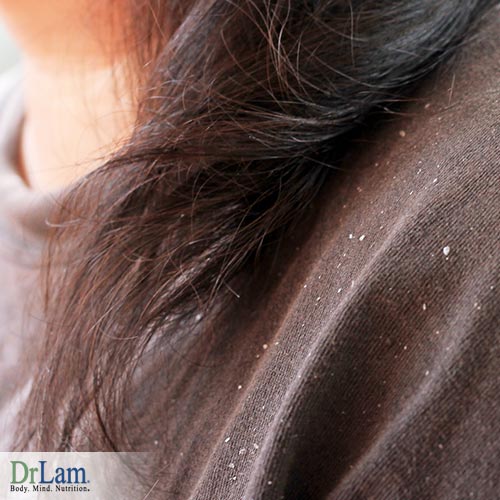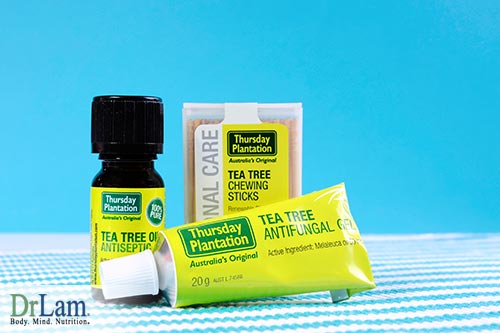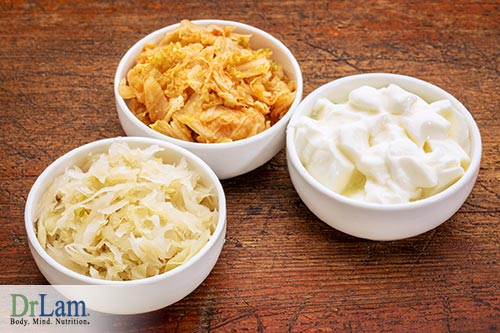 If you experience dandruff, you are not alone. Up to 50 percent of the world's population suffers from dandruff, reports a study published in the FEMS Yeast Research out of Oxford University, and are in need of natural dandruff remedies.
If you experience dandruff, you are not alone. Up to 50 percent of the world's population suffers from dandruff, reports a study published in the FEMS Yeast Research out of Oxford University, and are in need of natural dandruff remedies.
The most common symptoms of dandruff is an itchy, irritated scalp and small flakes sloughing off of your skin. Not only is the skin condition uncomfortable, but it can also be socially embarrassing when dead skin flakes show up in your hair or on your clothes.
It’s important to note that dandruff is not the same as dry scalp. While the latter might result in dry skin flakes, those flakes are simply caused by dryness. In contrast, dandruff is so much more than that. "Researchers are still studying the causes, which appear to be complex," reports the American Academy of Dermatology.
If you want relief from an itchy scalp and cascading skin flakes, seek out natural dandruff remedies that can help to soothe, heal and liberate your scalp from this irritating condition.
When you first notice dandruff, you might immediately rush out and buy an anti-dandruff shampoo. But these over-the-counter solutions are not as harmless and foolproof as you might think.
For example, the American Academy of Dermatology warns that some common over-the-counter shampoos contain ingredients like coal tar, which can make your scalp's skin more sensitive to sunlight. This can increase your risks of skin irritations and even skin cancer.
Some active ingredients in conventional treatments may also discolor your hair, especially if you're blonde, or make your hair and scalp more dry (which can cause skin flaking similar to dandruff).
In contrast, natural dandruff remedies often focus on lifestyle changes and gentle, organic ingredients that you can easily pick up at a health food store or from a natural health practitioner. Before resorting to conventional treatments, give these gentler options a try to see if they can effectively clear and clarify your scalp.
Some researchers hypothesize that dandruff symptoms are linked with an overgrowth of certain yeast fungi that populate your scalp’s surface. Topical oils that kill and control yeast and fungus growth can help.
 The oils extracted from the Australian Melaleuca alternifolia tree may be one possible solution. The University of Michigan Health system ranks tea tree oil as a safe natural topical and notes that it's widely used to kill fungi and bacteria.
The oils extracted from the Australian Melaleuca alternifolia tree may be one possible solution. The University of Michigan Health system ranks tea tree oil as a safe natural topical and notes that it's widely used to kill fungi and bacteria.
One study, published in the Journal of the American Academy of Dermatology, found that a 5% solution of tea tree oil in shampoo, used over the course of four weeks, reduced dandruff symptoms by 41%. There were "statistically significant improvements" in terms of scalp grease levels and skin itch. The researchers concluded that "5% tea tree oil appears to be effective and well-tolerated in the treatment of dandruff."
Another study compared tea tree oil against common over-the-counter anti-dandruff chemicals. The scientists found that the oil was just as effective, if not more effective, than the common anti-dandruff ingredients in some cases.
Tea tree oil isn’t the only topical oil that’s been shown to help control the growth of fungus and work as one of many natural dandruff remedies. Researchers also found lemongrass oil to be useful, as well as frankincense essential oil.
Raw, organic apple cider vinegar is one of the most popular natural dandruff remedies. It's made from apple must, which is fresh-pressed apple juice that contains the stems, skins, and seeds of the apple. The vinegar may be used as a shampoo or as a post-shampoo rinse.
The vinegar is rich in malic acid, which gives unripe apples their sour flavor. Malic acid is a type of alpha hydroxy acid, an all-natural chemical exfoliant that helps exfoliate your skin to get rid of dead skin cells and reveal healthier smoother new skin. This can help to eliminate the skin flakes commonly attributed to dandruff.
According to the Berkeley Center for Environmental Research and Children's Health, applying apple cider vinegar to your skin also helps remove dirt and oil, balances your scalp's pH levels (which may be off-balanced due to shampoo, conditioner and styling products), and can thus help to reduce scalp irritation, get rid of itching and soothe away dandruff.
The acidic nature of vinegar may also help to control fungus and yeast overgrowth, which is helpful if such overgrowth is one of the contributing factors in your dandruff problems.
 Your gut health has been linked to many things outside of your digestive system, including your mental health and mood. It also may manifest itself in your skin. One study found that taking probiotics - supplements that contain beneficial bacteria that populate your gut - reduced dandruff by 57%.
Your gut health has been linked to many things outside of your digestive system, including your mental health and mood. It also may manifest itself in your skin. One study found that taking probiotics - supplements that contain beneficial bacteria that populate your gut - reduced dandruff by 57%.
That's because ensuring your gut is populated with healthy bacteria can help improve skin immunity, boost how quickly your skin heals, and reduce inflammation.
You can boost your gut health by taking probiotic supplements, or by eating fermented foods like sauerkraut and kimchi. Don’t forget prebiotics, which are high-fiber foods that help your gut bacteria to flourish. Example prebiotics includes bananas, garlic, and onions.
Your adrenal glands are responsible for producing, storing and managing your body's hormones. When stress and other lifestyle factors make it too hard for your adrenal glands to function properly, you might experience hormonal imbalances that contribute to something known as adrenal fatigue syndrome (AFS).
There's a common link between increased dandruff risks and skin conditions like eczema and dandruff, all of which tend to flare up when someone is under a lot of stress. Thus, dandruff could be a sign that you’re either under excessive stress that could lead to AFS, or that your adrenal glands are already fatigued and dandruff could be a symptom of AFS.
Besides dandruff, other scalps- and hair-related symptoms include unexplained hair loss and graying hair.
Your skin, including the skin on your scalp, is often a reflection of what’s occurring internally within your body and mind. An emerging field of science known as psychodermatology is exploring how many skin disorders, such as dandruff and acne, are linked to stress, anxiety, depression, and your mental state. These mental states are in turn linked with AFS.
By taking steps to manage your emotional stress, like practicing yoga, meditation or deep breathing exercises, you can reduce the stress that contributes to both dandruff as well as AFS.
However, it’s important to work with a professional. For example, some medications that may be used to treat depression or anxiety may also cause skin inflammation and skin rashes. By reviewing your health history and lifestyle, a professional can determine whether your dandruff is linked with AFS and how to best manage both your adrenal health and your skin health without jeopardizing either.
Stress is a health risk, so your body uses a range of organs and systems in your body for something known as the NeuroEndoMetabolic (NEM) stress response system. This system works together to help your entire body work in unison to reduce and eliminate the harmful effects of stress.
But over time, especially if you place your body and mind under a chronic overload of stress, the NEM system can cease to work effectively. This can cause hormone imbalances that may irritate your skin, increase skin inflammation and provoke conditions like dandruff.
Always talk to an expert before trying to treat AFS or improve your NEM stress response system, as natural remedies may be ineffective, come with startling side effects, or even worsen your AFS symptoms while doing little to nothing for your dandruff concerns.
 So often, people like to focus on just one symptom or one skin problem without considering how it plays into your greater health and wellness. That’s why it’s important to understand the underlying causes of dandruff, consider natural dandruff remedies, and look at ways your internal health (including your adrenal health) can manifest itself in your scalp and skin.
So often, people like to focus on just one symptom or one skin problem without considering how it plays into your greater health and wellness. That’s why it’s important to understand the underlying causes of dandruff, consider natural dandruff remedies, and look at ways your internal health (including your adrenal health) can manifest itself in your scalp and skin.
If you try to self-treat dandruff with irritating over-the-counter solutions that raise your body’s stress levels, you might be inadvertently contributing to AFS which could make chronic skin conditions even harder to manage. Also, if you are very sensitive or in advanced stages of adrenal fatigue, even these natural remedies may be too much for you. Try diluting the products first before applying if that is the case.
By turning to natural dandruff remedies that soothe the skin, reduce skin inflammation, naturally manage yeast and fungi growth and balance out your hair and scalp’s pH, you help to restore your scalp to a place of natural balance and harmony.
This can also help to reduce the stress you place on your adrenal glands, thus creating a well-balanced and holistic approach to dandruff control. Talk to an expert today to see if this approach to scalp health is the answer you’ve been seeking.
Traditional anti-dandruff shampoos contain irritating ingredients that could do more harm than good and may make dandruff worse. Natural dandruff remedies help to gently clear dandruff while also minimizing skin stress that could be provoking the skin condition in the first place.
